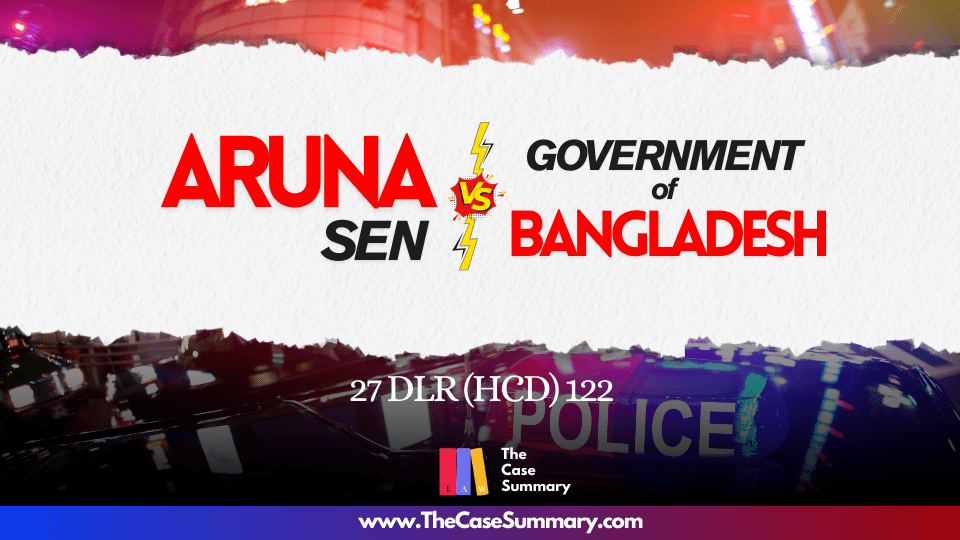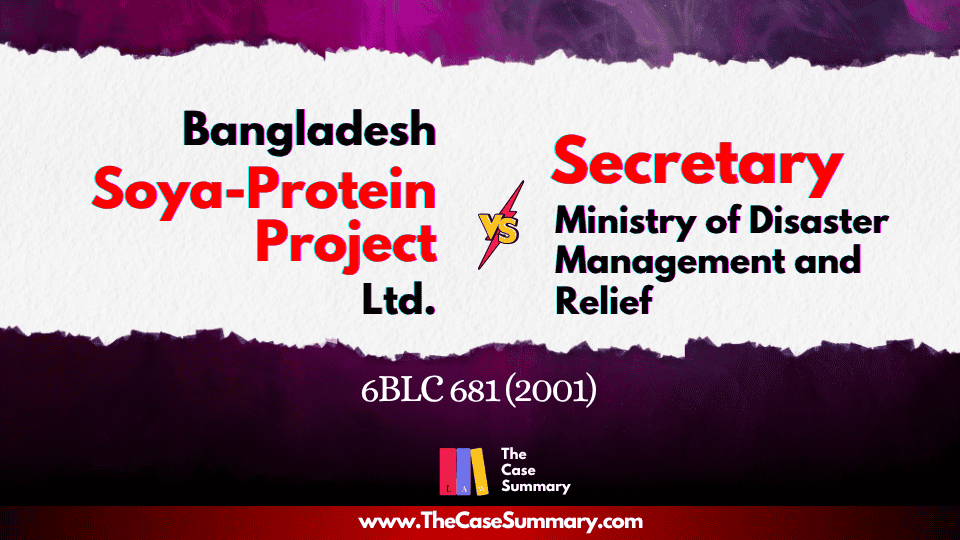Mrs Aruna Sen vs Government of the People’s Republic of Bangladesh and Others
Citation: 27 DLR (HCD) 122
Jurisdiction : Bangladesh
Petitioner: Mrs. Aruna Sen
Respondents: Government of Bangladesh and others
Facts :
Chanchal Sen was arrested by a few plainclothes police officers from his residence in Dhaka on 17th April 1974, without a warrant. The arrest was allegedly made under Section 54 of the Code of Criminal Procedure, 1898, which allows arrest without a warrant on suspicion of a cognizable offence. Chanchal was allegedly subject to severe physical and mental torture after his arrest. After the arrest, he was remanded to the police without any procedural compliance under section 167 of the Code of Criminal Procedure, 1898. Eventually, on 22nd April, 1974, the Government of Bangladesh issued a detention order under Section 3 (1) of the Special Powers Act, 1974. The Government accused him of being an active member of a secret organization, aiming to create chaos and undermine state authority, having illegal possession of arms and ammunition, providing shelter to subversive individuals and being involved in anti-state activities. These accusations served as the grounds for his detention by the executive. Aruna Sen, the mother of Chanchal Sen, filed the writ petition under Article 102(2)(b)(i) of the Constitution seeking a writ of Habeas Corpus and asked the court to declare the detention unlawful and direct the authorities to release Chanchal immediately. She also contended that the arrest was without a lawful basis and was done arbitrarily in violation of constitutional safeguards under Article 33.
Issues :
1. Whether the satisfaction of the detention was based on real and specific grounds (Objective Satisfaction).
2. Whether the High Court has the power to review preventive detention orders under Article 102(2)(b)(i).
Arguments :
Petitioner’s Arguments:
The petitioner argued that the arrest of Chanchal Sen was made without a warrant and without informing any reasons, which violated articles 33 (1) to 33 (3) of the Constitution. Moreover, the detention order, under the Special Powers Act, 1974, was an afterthought issued only after the illegal arrest and torture in custody. On the other hand, the grounds given for the arrest by the executive were vague and general in nature, and there was no sufficient supporting evidence or records to back them. The petitioner also argued for the objectivity of the satisfaction of the executive. Subsequently, the detention was also challenged as a breach of fundamental rights under Articles 26, 32, 33 and 36 of the Constitution.
Respondent’s Arguments (State):
The respondent argued that the detention order was lawful under the Special Powers Act, 1974, as it was issued under Section 3 (1) of the Act, which is based on the executive’s satisfaction that the detenu was involved in activities prejudicial to public order and the detention was made in good faith for public safety and security. Moreover, the executive’s satisfaction is not subject to judicial review.
Decisions :
The High Court Division held that the detention of Chanchal Sen was without lawful authority and of no legal effect. Therefore, a writ of Habeas Corpus was issued, and the Government was directed to release him immediately. Moreover, the detaining authority’s “satisfaction” under Section 3 (1) of the Special Powers Act, 1974 must be based on actual, reasonable and reviewable grounds following the objective test from cases like Nakunda Ali, Ghulam Jilani and Begum Shorish Kashmiri.
Relevant Laws :
- The Code of Criminal Procedure, 1898
- Section : 54, 167
- The Constitution of the People’s Republic of Bangladesh
- Article : 26, 32, 33, 36, 102
- The Special Powers Act, 1974
- Section: 3
Author :
1. Muhammad Ishrak Ahsan
2. Md. Fuad Hasan
Note : The Case Summary is a platform by the law students, for the law students. We aim to summarize the facts and decisions of various important cases in both Bangla and English with utmost caution. However, this platform is in no way a replacement for going through the complete judgements by the law students and we discourage any learner from relying on case summaries alone. Thank you



